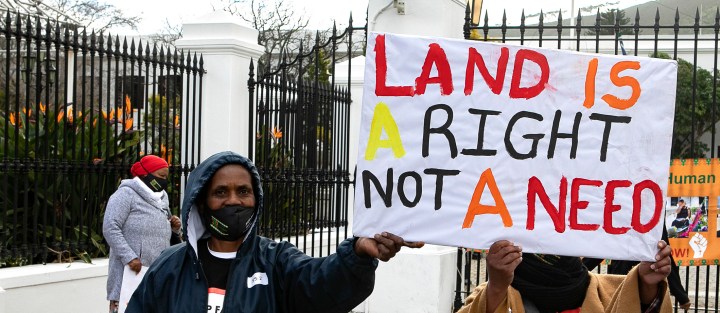MAVERICK CITIZEN
Expropriation bill ‘lacks sufficient protection for people with unregistered land rights’

The expropriation bill gives recognition to the fact that while unregistered rights are vulnerable, they are still valid and give recognition to communities who have these rights — such as those with customary land rights and farmworkers.
On 6 February land activists convened for the third episode of the expropriation bill webinar discussions, hosted by Siviwe Mdoda of the Tshisimani Centre for Activist Education, to answer the question, “Unregistered land rights: does the Expropriation Bill provide enough?”
Mdoda started by quoting what the Expropriation Bill defines as registered and unregistered land rights:
Registered land rights: registered or recorded with a government office in which rights in respect of land, minerals and any other property are registered and recorded for public purpose in terms of any law.
Unregistered land rights: a right to property including a right to occupy or to use land which right is recognised by law but it is neither registered nor required to be registered.
Zenande Booi, a lead researcher from the Land and Accountability Research Centre, said that the wide definition of unregistered land rights was that of land held under customary law and group tenure, rights held by labour tenants and farmworkers. Booi explained that these rights are still valid even though not officially registered or recorded.
Booi said that how the bill proposes to deal with unregistered rights is inadequate because it does not take into account or deal with the contextual reality of how it came about that people have these vulnerable unregistered rights, which was as a result of a state determined to “facilitate and legitimise the systemic dispossession of people of their land”.
She said that people’s unregistered rights were further weakened by the imposition of a system of private property, which was a legal system based on Roman-Dutch Law. This system of law explicitly excluded black people from taking part in it and from having rights over their land.
Therefore, continued Booi, the expropriation bill is the first time that it is clear that if holders of unregistered land rights are to be deprived of land rights, there is a specific legal process that needs to be followed and that they would need to be compensated. This, she said, was a welcome step in the right direction.
Booi contended that land rights under customary law and land tenure rights are not understood by the state and private institutions. By way of example, she said mining rights have the effect of depriving people and communities of their land rights. These rights are awarded by the Department of Minerals and Energy without prior consultation and consent from communities, and neither are communities compensated.
She said that when mining companies get the mining rights they exercise them as though people’s land rights are not valid, moving people off their land and inhibiting access to resources such as grazing land or rivers for water, creating a breakdown in communities and their societal structures.
Another critique Booi made of the bill was that when dealing with expropriation it was not enough to consult only the owner with registered rights to the property. This left out those with unregistered rights and there was no process of verifying information supplied by the property owner. This meant that when going through the process of expropriation, information on people on the land with unregistered rights could be hidden.
People with unregistered rights should not have the same expectations of them as those with registered rights because of the skewed power relationship between the two. For example, a farmer and farm labourer/tenants where the farmer can evict them without recourse even though farm labourers or tenants have land rights of which they are often unaware.
“What this bill needs is clear, explicit, proactive processes that proactively take into account the vulnerable contexts of the unregistered rights, it’s not enough to just recognise that they exist,” said Booi.
According to Booi, at the very least each and every rights holder needs to be identified in order to identify the appropriate way to deal with these rights.
As it stands, the expropriating authority places the onus on people with unregistered rights to make a claim for compensation; however, most of these people do not have the resources or knowhow to evaluate what just and equitable compensation would be, said Booi.
In closing, she said it was important to appreciate that rights to land weren’t just about commercial or residential consideration. It was often integral to a community’s survival and held spiritual and cultural significance which are not considered in the formal valuation process for expropriation.
“When land expropriation was put forward in a political context, it was as if land expropriation will take the land from white owners who own most of the land, but they are in the minority and transfer it to the black people.” said Bonani Loliwe, provincial coordinator of Vulamasango Singene.
He said that land restitution had offered to compensate people only monetarily and not through the return of land, which he said was what people had been saying that they wanted. DM/MC





















 Become an Insider
Become an Insider
Comments - Please login in order to comment.